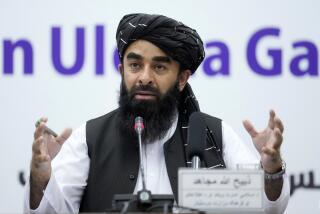Gates optimistic on Afghanistan
- Share via
KABUL, AFGHANISTAN — Defense Secretary Robert M. Gates arrived Sunday evening for his second visit to the Afghan capital since becoming the Pentagon chief, saying that he believes progress is being made in the country, but he wants to ensure there is no slackening of effort.
Gates first visited Afghanistan in January, just weeks into his tenure, after which he expressed guarded optimism, saying the situation on the ground was better than he had expected.
Senior Defense Department officials close to Gates said he believed things had improved since then, despite a rise in violence in the restive south.
“Although the level of violence is actually up, I think that in terms of what we were concerned the Taliban might be able to accomplish, things are looking better than they were, certainly than when [Gates] was here in January,” said one senior Pentagon official who requested anonymity.
Speaking to reporters on his plane en route to Kabul, Gates said he planned to meet with Afghan President Hamid Karzai as well as the new commander of NATO-led forces, U.S. Army Gen. Dan K. McNeil, and new U.S. Ambassador William B. Wood to get their assessments on whether coalition efforts in Afghanistan were being properly coordinated.
Gates said he was concerned that the 42 countries and 12 nongovernmental organizations working on reconstruction might not be united by an “overall strategy” to deal with security and development issues.
“I think actually things are slowly, cautiously headed in the right direction. I’m concerned to keep it moving that way,” Gates said.
Thirty-nine U.S. troops and 39 other coalition soldiers have been killed so far this year in Afghanistan, comparable to figures from the year before, according to the website icasualties.org, which tracks casualties in Iraq and Afghanistan.
Pentagon officials said the long-expected Taliban spring offensive appeared to have sputtered and argued that it was because the security mission led by the North Atlantic Treaty Organization had pushed Taliban fighters out of their strongholds and led to the capture of key militant leaders.
But the senior Pentagon official added that violence this spring was up from the same time last year and expressed concern that once the opium poppy harvest was completed in the coming months, more Taliban fighters would return to the battlefield.
“What I’m concerned about is the follow-up,” the official said. “How are we going to hold those areas where we’ve had success?”
Adding to the concern is the recent appearance of so-called explosively formed projectiles, roadside bombs that can penetrate armor and were previously used only in Iraq.
The U.S. has alleged that Iran is playing a role in exporting such weapons, and Marine Gen. Peter Pace, chairman of the Joint Chiefs of Staff, said over the weekend that there was evidence that Iranian-made weapons were entering Afghanistan -- although it remained unclear whether the government in Tehran was behind the shipments. U.S. officials have yet to provide evidence of Iranian involvement in Afghanistan.
The senior Pentagon official said it remained unclear what the motives would be for any Iranian shipments. In the past, Iran has been a comparatively benign influence in Afghanistan, helping ensure stability in border regions around the western city of Herat. But, he added, there is mounting evidence that Iran has become a more destabilizing influence.
“They portray themselves as supportive of the Karzai government, but they’ve been sending tens of thousands of Afghan refugees back into the country, and there’s some sign they’re providing some of these weapons,” the official said.
More to Read
Sign up for Essential California
The most important California stories and recommendations in your inbox every morning.
You may occasionally receive promotional content from the Los Angeles Times.










